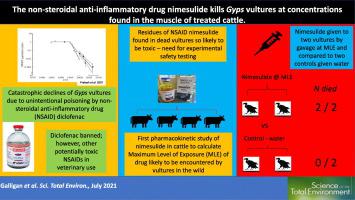Science of the Total Environment ( IF 9.8 ) Pub Date : 2021-10-04 , DOI: 10.1016/j.scitotenv.2021.150788 Toby H Galligan 1 , Rhys E Green 2 , Kerri Wolter 3 , Mark A Taggart 4 , Neil Duncan 5 , John W Mallord 1 , Dawn Alderson 6 , Yuan Li 4 , Vinny Naidoo 5

|
Throughout South Asia, cattle are regularly treated with non-steroidal anti-inflammatory drugs (NSAIDs) and their carcasses are left for scavengers to consume. Residues of the NSAID diclofenac in cattle carcasses caused widespread mortality and catastrophic population declines in three species of Gyps vulture during the 1990s and 2000s. Diclofenac is now banned, but other NSAIDs are used in its place. Different lines of evidence, including safety testing in Gyps vultures, have shown that some of these other NSAIDs are toxic, or probably toxic, to vultures. The NSAID nimesulide is widely available and commonly used, and has been found in dead vultures with signs of renal failure (i.e. visceral gout) and without the presence of diclofenac and/or other vulture-toxic NSAIDs. Nimesulide is therefore probably toxic to vultures. Here, we report safety testing of nimesulide in Gyps vultures. In a controlled toxicity experiment, we gave two vultures the maximum likely exposure (MLE) of nimesulide calculated from initial pharmacokinetic and residue experiments in cattle. Two other control birds were given an oral dose of water. Both vultures dosed with nimesulide died within 30 h, after showing outward signs of toxicity and increases in biochemical indicators of renal failure. Post-mortem examinations found extensive visceral gout in both vultures. Both control vultures survived without biochemical indicators of renal failure. With this evidence, we call for an immediate and comprehensive ban of nimesulide throughout South Asia to ensure the survival of the region's Critically Endangered vultures. More generally, testing the impacts of drugs on non-target species should be the responsibility of the pharmaceutical industry, before their veterinary use is licensed.
中文翻译:

非甾体抗炎药尼美舒利在处理过的牛肌肉中发现的浓度可杀死吉普斯秃鹰
在整个南亚,牛定期接受非甾体抗炎药 (NSAIDs) 治疗,它们的尸体留给清道夫食用。在 1990 年代和 2000 年代,牛尸体中的 NSAID 双氯芬酸残留物导致了三种Gyps秃鹰的普遍死亡和灾难性的种群下降。现在禁用双氯芬酸,但使用其他非甾体抗炎药代替。不同的证据,包括Gyps 的安全测试秃鹫,已经表明这些其他 NSAID 中的一些对秃鹰有毒,或者可能有毒。NSAID 尼美舒利是广泛可用和常用的,并且已在具有肾功能衰竭迹象(即内脏痛风)的死秃鹰中发现,并且不存在双氯芬酸和/或其他对秃鹰有毒的 NSAID。因此,尼美舒利可能对秃鹰有毒。在这里,我们报告尼美舒利在Gyps 中的安全性测试秃鹫。在受控毒性实验中,我们为两只秃鹫提供了尼美舒利的最大可能暴露量 (MLE),这是根据牛的初始药代动力学和残留实验计算得出的。另外两只对照鸟被给予口服剂量的水。在表现出毒性的外在迹象和肾功能衰竭的生化指标增加后,两只服用尼美舒利的秃鹫都在 30 小时内死亡。尸检发现两只秃鹫都有广泛的内脏痛风。两只对照秃鹫在没有肾功能衰竭的生化指标的情况下都存活下来。有了这些证据,我们呼吁在整个南亚立即全面禁止尼美舒利,以确保该地区极度濒危秃鹰的生存。更一般地说,测试药物对非目标物种的影响应该是制药业的责任,



























 京公网安备 11010802027423号
京公网安备 11010802027423号